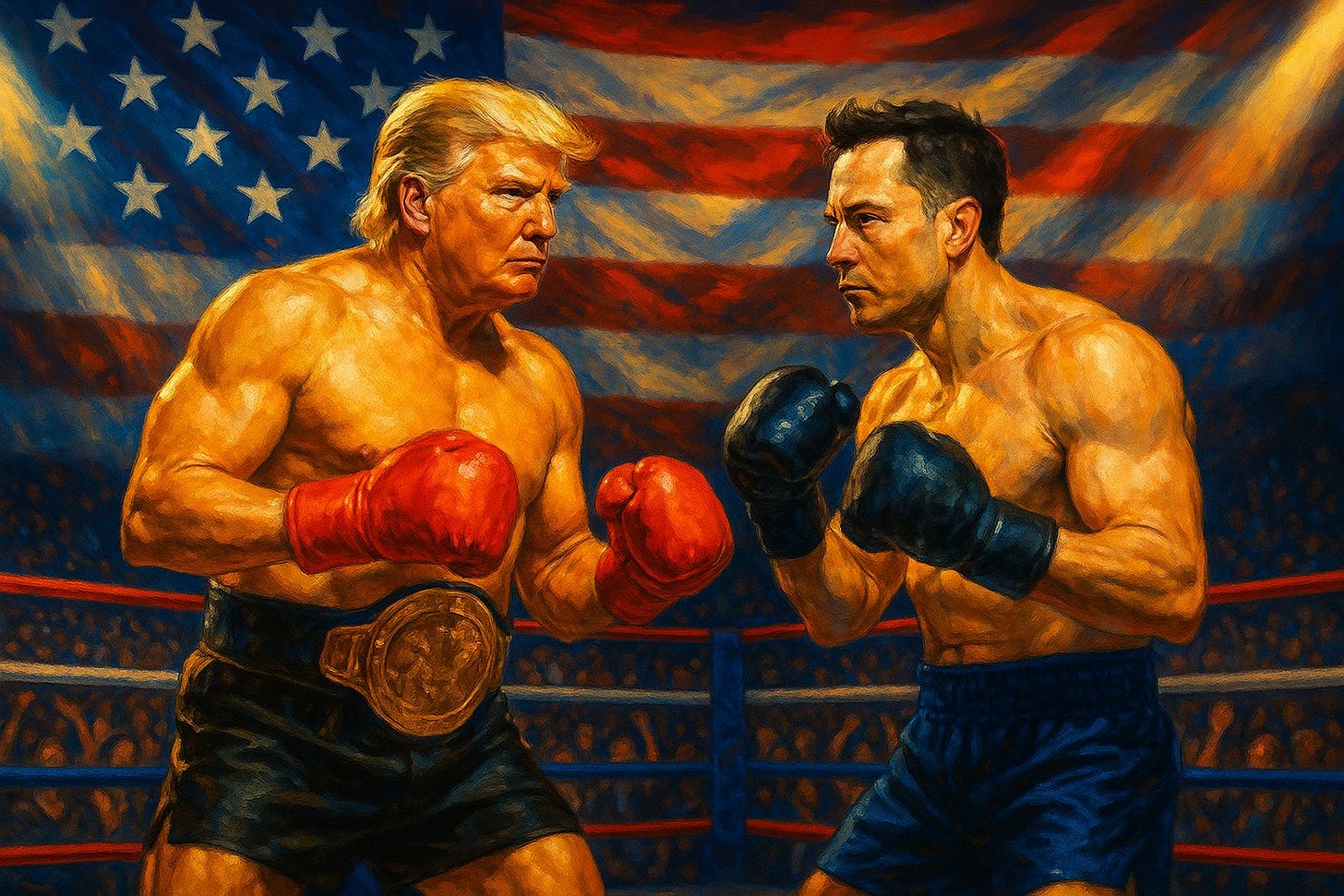[ Trump-Musk] The Show Must Go On
It is remarkable that the Trump-Musk bromance lasted as long as it did. Their highly publicized rift is dramatic, and their forthcoming reconciliation is likely to be equally spectacular.
A key point often overlooked here in Europe, is that the U.S. Constitution, as the foundation of a federal system, establishes federal governance by a capable oligarchy. This is common across federal states, from Germany to Brazil, Russia, and Mexico. Democratic processes primarily unfold at the state level, where the federal leadership is cultivated - not in Washington. This accounts for the indirect election of the U.S. president and the streamlined composition of Congress: 100 senators (two per state) and 435 representatives. In contrast, France, as a 67 million inhabitants’ unitary state, maintains a larger legislature with 577 representatives and 348 senators.
The ratification of the U.S. Constitution in 1787 faced significant resistance from a populace skeptical after over a century of British rule. Its adoption required the Federalist Papers—85 essays by Alexander Hamilton, James Madison, and John Jay—and the pivotal inclusion of the Bill of Rights as the Tenth Amendment to secure state ratification.
The Bill of Rights guarantees fundamental freedoms: speech, religion, press, assembly, and petition; the right to bear arms; protection against quartering soldiers without consent, unreasonable searches, and seizures; safeguards in criminal justice, including against self-incrimination and double jeopardy; rights to fair, speedy trials and civil juries; and bans on cruel punishments or excessive fines. It also reserves unlisted rights to the people and undelegated powers to the states or citizens.
Altering the Bill of Rights would undermine the Constitution’s legitimacy for most Americans, making issues like free speech and gun rights highly contentious when federal or external entities, like the EU, attempt a power grab. This also explains the lack of outcry over eliminating the federal Department of Education, nonexistent before 1981, and why abortion, not a right listed in the Constitution, is a state matter subsequently to the U.S. supreme court repel of Roe vs Wade.
Donald Trump’s two elections reflect, beyond the electorate rejecting progressive ideology, resistance to an increasingly expansive federal government, a trend accelerating since 2000 under successive administrations, including Trump’s first term.
The public dispute between Trump and Elon Musk centers on Trump’s proposed budget, the “Big Beautiful Bill,” which raises the federal debt ceiling. Musk criticizes the debt’s burden, with interest now surpassing defense spending. Trump’s threats to cancel Musk’s federal contracts—potentially crippling U.S. satellite capabilities—are countered by Musk’s provocative claims about Trump’s ties to Jeffrey Epstein.
The managerial ideology Musk partly embodies, despite libertarian leanings, is ill-suited for governing complex democratic systems with divergent political and social interests. This is evident in Europe, where simplistic, consultant-driven policies—on COVID, emissions zones, energy transitions, or pension reforms etc.—consistently fail.
Governing demands foresight and understanding of societal dynamics, unlike managing, which focuses on organizing for acheiveing predetermined outcomes.
No U.S. president since Roosevelt has avoided raising the debt ceiling in their first budget, as it’s key to midterm election success. Major reforms typically follow midterm victories, as seen with Roosevelt’s New Deal post-1934. The fact of the matter is that Trump 2 is a second first term.
The Trump-Musk dispute echoes the fierce conflict between Franklin D. Roosevelt and Randolph Hearst, the pioneering media magnate, during the Great Depression. Though aligned on core solutions, they diverged on approach and timing. Hearst pushed for swift, radical action, while Roosevelt focused on fostering stability and public trust to ensure civil order and midterm electoral success, paving the way for his reforms in the second half of his first term. History validates Roosevelt’s measured strategy over Hearst’s impulsive one.
The key question is whether Trump, if victorious in next year’s midterms, will tackle public spending, given he cannot seek a third term, rather than yielding to the comfortable temptation of allowing public expenditure to escalate unchecked, leaving the matter to his sucessor.
The European media, often misinformed on U.S. affairs, will likely sensationalize this conflict as a decisive blow to Trump. However, reconciliation between Trump and Musk is probable, driven by mutual need and respect. Peter Thiel may see to it, once again. And Musk may learn that funding a campaign offers influence, not control.



